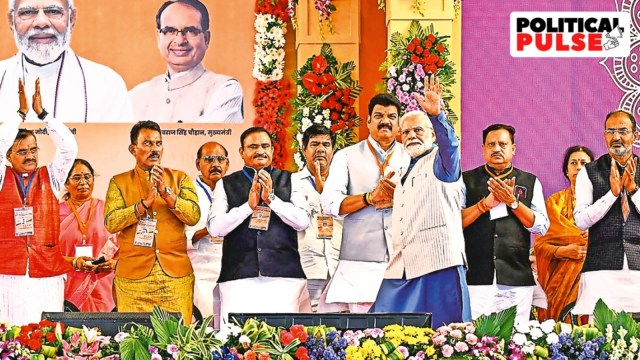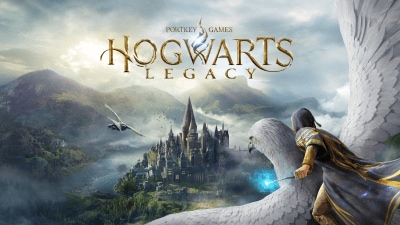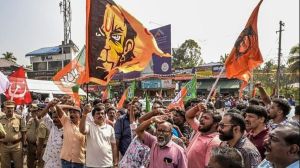111 PM speeches: Congress, vikas key themes; ‘4 castes’ find mention, Hindu-Muslim post-April 21
An analysis of campaign speeches by Prime Minister Narendra Modi for the Lok Sabha election reveals an uptick in comments playing on fears of wealth redistribution and religion-based reservation.
 Modi also began the campaign with repeated calls for “400 paar” — the BJP’s target to win more than 400 Lok Sabha seats with its allies. (Express file photo)
Modi also began the campaign with repeated calls for “400 paar” — the BJP’s target to win more than 400 Lok Sabha seats with its allies. (Express file photo)Attacking the Congress and its first family as the ancien régime, vikas and vishwaguru, and holding out the promise of Viksit Bharat by 2047: These themes have been a refrain in Prime Minister Narendra Modi’s speeches since the elections were notified on March 16. After the release of the Congress manifesto on April 5, the rhetoric swerved towards Hindu-Muslim issues and the idea of wealth redistribution and religion-based reservation at the expense of SC/STs and OBCs.
An analysis of the 111 speeches delivered by Modi from March 17 to May 15 by The Indian Express – drawing from the text available on narendramodi.in – shows how the key themes and changes in emphasis powered the narrative of his party and government as they bid for a third term.
He spoke of employment in 45 of his speeches and it was usually in the context of jobs generated through government projects and schemes. Inflation was mentioned in five speeches – framed as being cushioned by Central schemes and kept under control.
 An analysis of the 111 speeches delivered by Modi from March 17 to May 15 by The Indian Express – drawing from the text available on narendramodi.in
An analysis of the 111 speeches delivered by Modi from March 17 to May 15 by The Indian Express – drawing from the text available on narendramodi.in
March 17-April 5 (10 speeches): Focus on central schemes, ‘corruption’ by Opposition
After the MCC came into force on March 16 and until the Congress released its manifesto on April 5, welfare schemes and the BJP’s development pitch were the major themes of Modi’s speeches, figuring in all 10 of his speeches in this period. The “vishwaguru” theme of India’s rising global stature also featured prominently finding mention in as many as eight of the 10 speeches.
In this period, his attacks against Congress and the Opposition revolved around allegations of nepotism, corruption and misgovernance, invoked in all 10 speeches.
Modi also began the campaign with repeated calls for “400 paar” — the BJP’s target to win more than 400 Lok Sabha seats with its allies. In these first 10 speeches, there were eight mentions of this goal. In six of 10 speeches, Modi brought up Ram and Ram temple as a BJP achievement.
April 6-April 20 (34 speeches): First mention of ‘Muslim League manifesto’
The Congress’s manifesto was released on April 5. In Ajmer, Rajasthan, in his April 6 rally, Modi said the manifesto had the imprint of the “Muslim League”. In this time period, Modi made the claim of the Nyay Patra being a “Muslim League manifesto” in seven of 34 speeches.
He also alleged the Opposition was “anti-Hindu” (17 out of 34 speeches), particularly for skipping the Ram temple consecration ceremony in Ayodhya in January. In this period, there were 26 mentions of Ram and the Ram temple.
Accusations of nepotism and corruption were still the primary line of attack against the Opposition, the Congress in particular — the latter was mentioned in 27 speeches.
Development, welfare schemes and “vishwaguru” remained prominent themes in this period, with 32, 31 and 19 mentions respectively. However, the call for “400 paar” became sparse in this stretch — the slogan was invoked in a total of 13 speeches out of 34.
April 21-May 15 (67 speeches): Wealth redistribution and religion-based reservation
Welfare schemes and development remained the strongest plank for campaigning in this period — 60 of 67 speeches. The number of mentions of Ram and the Ram temple in Ayodhya was 43.
The slogan of “400 paar” and references to the target fell further in relevance in Modi’s speeches with just 16 mentions in 67 speeches.
In Banswara, Rajasthan, on April 21, Modi referred to Muslims and then mentioned “ghuspaithiye (infiltrators)” for the first time in the context of wealth redistribution. Over his total 111 speeches, there were 12 mentions of infiltrators.
In many cases, Modi also claimed Hindu women’s “streedhan”, that is, their mangalsutras, may be under threat of being taken away. The first mention of the mangalsutra comment was in the Banswara speech. Since then, mangalsutra figures in 23 speeches out of 67 in this period.
In the run-up to the second phase of voting until shortly before Phase 5, that is April 21 to May 15, Hindu-Muslim comments — wealth redistribution to benefit Congress’s “Muslim vote bank” or the “loot” of reservation from SCs, STs and OBCs — featured in 60 out of 67 speeches.
In this phase too, misgovernance and corruption by Congress and the Opposition were raised by Modi, in 63 and 57 speeches respectively.
Modi’s four castes – women, youth, farmers, poor
Last year, Modi had declared that four key “castes” – women, youth, farmers and poor – would drive development in India and were constant themes in his campaign speeches.
While Modi frequently spoke about the poor – featuring in 84 of his 111 speeches in which he showcased his government’s work to lift 25 crore people out of poverty over the last decade, as per a NITI Aayog estimate – farmers and youth found mentions in 69 and 56 speeches respectively. Women figured in 81 of his speeches and have been a key demographic for the BJP in recent polls. Modi spoke of the BJP’s women-centric initiatives from subsidised LPG cylinders to 33 per cent reservation for women in the Lok Sabha to the “Drone Didi” programme.
- 01
- 02
- 03
- 04
- 05






























